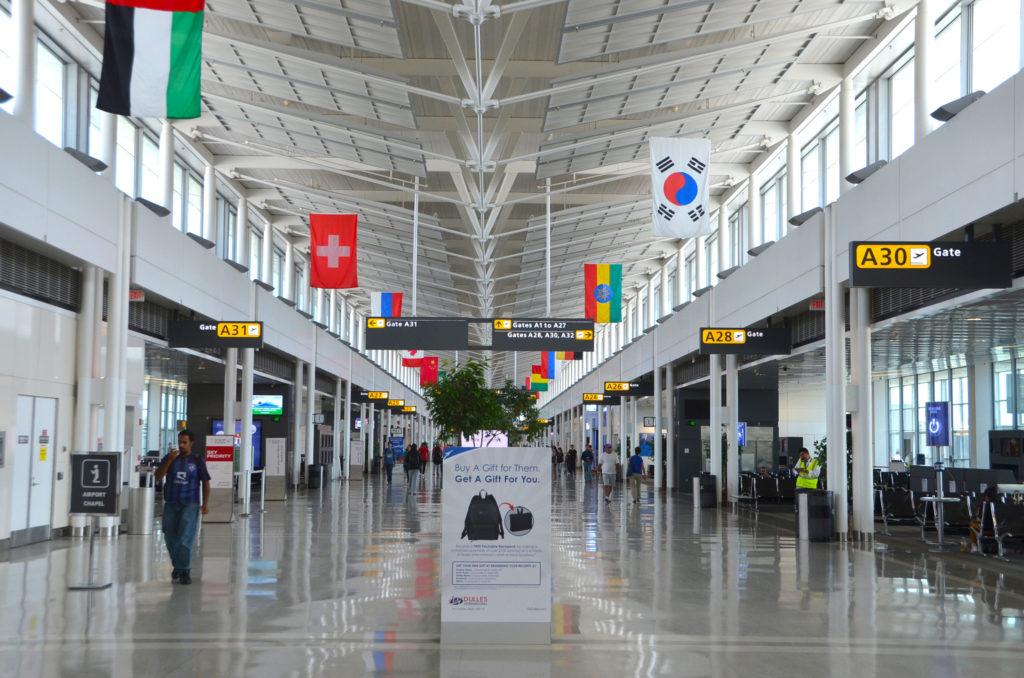When first-year graduate student Saumya Rajamohan arrived at Dulles International Airport from her home in India in January, she was unsure what was waiting for her on a campus she had never been to in a city she did not know.
But when Rajamohan saw three students and faculty she had been in contact with waiting in the airport to offer her snacks, a Metro pass and a welcome guide including a map of campus and tips for where to buy class textbooks, she felt instantly at home.
Students, staff and faculty greeted more than 50 incoming students and their families at Dulles International Airport in the fall and spring in the first year of the University’s airport welcome initiative. Officials said the program will continue next year after hearing positive feedback from international students, who said the initiative helped them adjust quickly to a new country and find new friends and peers.
“You know someone known to you is going to be at the airport to receive you,” Rajamohan said. “It kind of puts you at ease, it means that initial discomfort is gone. There’s no need for anxiety or fear making the travel.”
The International Services Office introduced the program last fall as part of an initiative to ease students’ transition to the United States.
Jennifer Donaghue, the ISO director, said students, faculty and staff greeted incoming students for two days last fall and three days last spring and fielded questions about GW, like where to pick up their GWorld cards and where to buy textbooks.
She said incoming students and their families were welcomed by the ISO, members of the International Students Association and International Student Community Ambassadors, a group of students who advise and assist their peers.
“There was an overwhelming, positive response from students and parents who were delighted to see groups of ‘GW faces’ at the airport when they arrived,” Donaghue said in an email.
She said the ISO expanded the program in January to include shuttle pickups. Four buses brought international students and their families from the airport to campus for three days, she said.
“It was a long couple of days, but they were meaningful days as both our International Student Community Ambassadors and incoming students let us know that they were excited to be able to bond with fellow students during the bus rides,” Donaghue said.
Former Student Association President Peak Sen Chua, who is from Malaysia, helped spearhead the program connecting international students to other students and staff before orientation.
“I think my main goal was to make sure when students landed in the United States after hours and hours of flying thousands of miles, that they were able to find some guidance and they were able to feel like GW was thinking about them,” he said.
Chua said the University has “often overlooked” international students’ needs – like finding a community on a largely domestic campus – because international students are a minority population. International students constituted about 14 percent of the student body this fall.
He said programs focused on integrating international students into the student body help officials and student leaders become more aware of and address their concerns about living in a new country.
“While they’re here, we want to make sure they’re welcome and they are able to be welcomed in a way that fits them, that is tailored to them because they have very unique needs,” Chua said.
Rupa Kalahashti, an international student from India and the graduate fellow for the International Student Community Ambassadors, helped plan the airport welcome in the fall semester and greeted students at the airport in January. She said the program allows international students to familiarize themselves with the ISO and its services from the start of their time at GW.
“Because they see us at the airport or hear from us right before they come, they tend to open up faster in coming to our events or even coming to our workshops and approaching us for any kind of advising,” she said.
She said faculty, students and staff created signs to bring to the airport displaying phrases like “GW welcomes you here,” which reassured incoming students and “made them extremely happy.” Kalahashti added that the ISO is searching for additional ways to increase awareness about the program on top of the brochures and emails the office currently sends out.
“Along with the students being able to be comfortable, to see someone they’ve spoken to before, it’s also the families being able to be comfortable, to see someone is going to be receiving your son or daughter,” she said.





